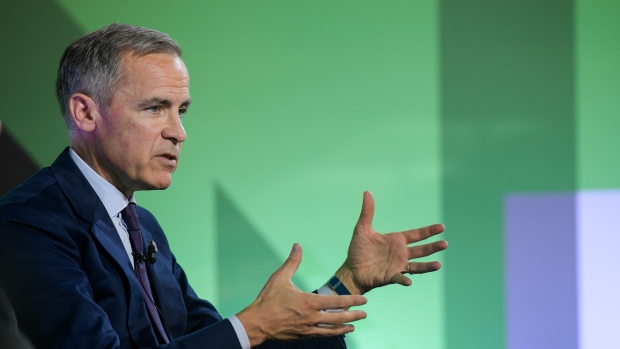Jul 17, 2018
Carney says Bank of England will weigh in on Brexit deal
, Bloomberg News

Mark Carney thrust the Bank of England into the Brexit debate again, saying he’ll give a thumbs up — or down — to any divorce deal that U.K. Prime Minister Theresa May reaches with the European Union.
“We will have to give our view on whether or not the arrangements are consistent with our ability to fulfill our statutory responsibilities,” the Bank of England governor said Tuesday, testifying to lawmakers on the Treasury Committee in Farnborough, U.K. The central bank is responsible for maintaining monetary and financial stability.
Leaving the EU with no deal in place would have a major impact on the economy and the central bank is preparing contingency measures for that scenario, he added. While the bank has no seat at the Brexit negotiating table, it does have a role in providing advice.
Carney has made warnings on Brexit in the past, though they are now particularly salient as the prime minister’s Conservative Party remains split on how to deliver the divorce. Time is running out, with just three months left before an October deadline to secure an exit deal ahead of the country’s formal departure in March.
Britons would be worse off if the U.K. fails to get a deal with the bloc and instead trades with it under World Trade Organization rules, Carney said. “Moving from the situation of an integrated market to a much less integrated system, with some financial consequences on top, would be a hit to the economic performance of the country relative to the status quo,” he said.
Having no deal in place could potentially present a “financial stability event” for both Britain and the EU, he said.
Carney has previously laid out various Brexit scenarios and the corresponding monetary policy measures they might require, saying that rates could move in either direction depending on the outcome. From an oversight perspective, Bank of England official Sam Woods said last week that the central bank would have a hard time doing its job if the U.K. has no say in the rules enforced by the EU for financial institutions.
Tuesday’s comments were Carney’s last public remarks before policy-makers enter a quiet period ahead of their Aug. 2 interest-rate decision. Investors and economists expect the central bank to raise interest rates, with economic data pointing to output recovering from a weak first quarter and continued growth in the labor market.
With assistance from Elizabeth Burden and John Glover
